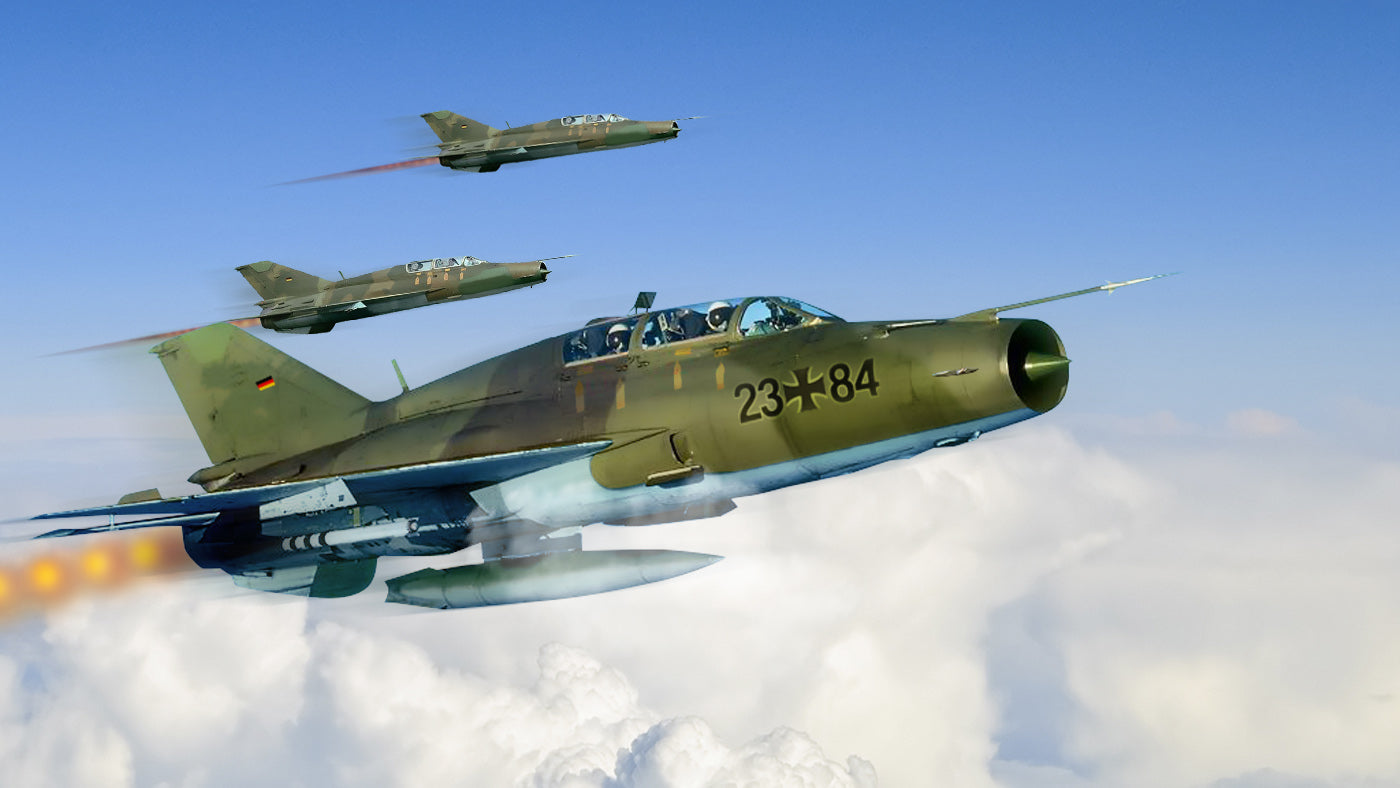
- by Dianna Lopez
Mikoyan-Gurevich MiG-21 Fishbed: The Supersonic Jet Fighter To Beat
- by Dianna Lopez
A question? Visit our contact page
This site uses cookies for better user experience and analytics.

When MotoArt owner Dave Hall discovered a MiG-21 UM in Georgia last year, he was stoked for himself and for the PlaneTags collector community. Keep reading to learn more about the MiG-21 and how MotoArt turned the cockpit of one into one of the most exciting PlaneTags to date.

The Mikoyan-Gurevich MiG-21 is a supersonic jet fighter/interceptor aircraft, built in the former Soviet Union. First flown in 1955, and introduced in 1959, they were well received and widely exported to around 60 countries, among 4 continents. They were highly adaptable by any air force for their specific needs. This record setting aircraft is:
The rugged lightweight fighter was built after the Korean War, to fill a need for a short range light strike fighter and interceptor. They faced the F-4 Phantom and other US-built fighter aircraft in head-to-head conflicts throughout the Cold War.

There are several main and sub versions of the MiG-21, divided into different generations; however, all variants have about the same endurance and speed.
In addition to being the most produced supersonic fighter ever built, with approximately 11,496 units produced, the design was licensed and built by other countries. The People’s Republic of China, for instance, licensed and built more than 2,400 units named Shangdoj J7 or F7.

MiG-21UM Preschen flickr photo by Rob Schleiffert shared under a Creative Commons (BY-SA) license

Drawing by Rob Schneider
Fishbed is the NATO reporting name for the MiG-21. What are NATO reporting names? They are code names for military aircraft from countries like Russia, the People’s Republic of China and nations of the former Warsaw Pact or Eastern Bloc. The Five Eyes Air Force Interoperability Council (AFIC) assigns unambiguous English codenames for fighters and military aircraft, sometimes called NATO reporting names or NATO designations. The Five Eyes is an intelligence alliance amongst the United States, United Kingdom, Canada, Australia (non NATO), and New Zealand (non NATO) nations, created after WWII and now recognized as the largest intelligence network in history.

The renowned MiG Design Bureau was named in 1939 by combining the names of its founders Artyem Mikoyan and Mikhail Gurevich. MiG was mainly concentrated on developing its fighters, using a few basic elements to create a plethora of variants. The MiG-21 and other Soviet fighters were simpler than American fighters, manufactured with traditional materials and a basic design that allowed for fast production in large quantities. They were also rugged and tough, able to be maintained without skilled labor and requiring minimal logistical support to operate. They were notable for fighter and interceptor planes, used by the Soviet and Russian Air Forces, as well as Soviet allies, Indian Air Force and Arab states.

MotoArt’s MiG-21, S/N 203, was delivered to the East German Army in May 1972. 203 served with JG-3 (Fighter Squadron), TAFS-47 and TAFS-87 (Tactical Reconnaissance Squadrons), and was later absorbed into the unified German Air Force as 23+84. 203 was withdrawn from use in 1991 and salvaged soon after. MotoArt acquired this mighty MiG-21 in 2021 and has now preserved it as collectible PlaneTags.


When MotoArt owner Dave Hall discovered the cockpit of #203 he was elated. “Many of us grew up hearing about the MiG and what an incredible aircraft this is,” says Hall. “We were stoked to get this.”












The many textures, paint and colors of #203 makes our MiG-21 PlaneTags some of our most interesting military PlaneTags to date. This small series is numbered to 3,500 and is expected to be one of our best selling Cold War or Military planes. They are customizable, allowing you to engrave to use as a luggage tag or with a special sentiment or message for a gift. Add one to your collection - available now at planetags.com.

Read more about some of our favorite Cold War birds - and missiles - from the past:
Titan II: Peace Through Deterrence
The Handley Page Victor: A V-Bomber That Delivered
Convair B-36: An Intercontinental Bomber That Kept The Peace
Yakovlev Yak-3UA “Full Noise”: From Fighter to Reno Air Racing Competitor
The Yakovlev Yak-3 is widely regarded as one of the most effective Soviet fighters of World War II. Compact, lightweight, and optimized for low-altitude combat, it earned a strong reputation among pilots on the Eastern Front for its maneuverability and climb performance.
The Yakovlev Yak-3UA known as Full Noise carries that legacy into the modern era. Built in 1993 using original Soviet tooling and engineering drawings, later powered by an American Allison V-1710 engine, and campaigned in the Unlimited class at the Reno Air Races, this aircraft represents a rare intersection of wartime design, post Cold War reconstruction, and modern competition.
USS Midway History: Preserving the Materials of a Legendary Carrier
Working with a ship as historically significant as USS Midway carries a responsibility that goes beyond creation. Commissioned in 1945 and serving for nearly fifty years, Midway was not only a cornerstone of U.S. naval aviation, but a place shaped by daily work, movement, and life at sea.
This project, developed in partnership with the USS Midway Museum, is rooted in preservation first. The materials being used are not simply artifacts. They are elements that played essential roles in how the ship moved, operated, and sustained the people aboard her. Each piece tells a different part of Midway’s story, and together they offer a fuller picture of service aboard one of the most important aircraft carriers of the 20th century.
Flying United for Three Decades: Airbus A320 N404UA
When the Airbus A320 entered service, it marked a turning point in commercial aviation. United Airlines’ A320 N404UA spent nearly three decades as part of that legacy, flying thousands of routes before its retirement and preservation through PlaneTags.


Share:
Delta 757: The Backbone of the Fleet
Convair 990: A Legacy of Speed